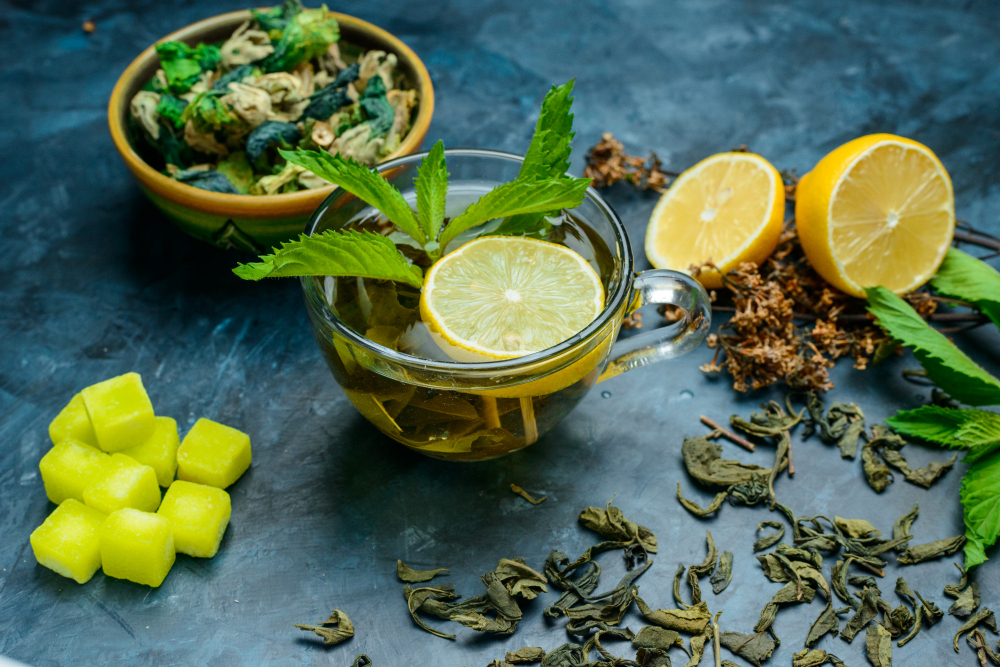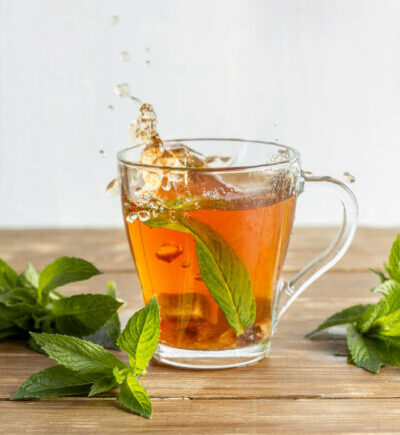Detox tea typically refers to herbal teas or blends of herbs that claim to support the body’s detoxification processes. These teas often contain a combination of herbs, roots, flowers, and other plant-based ingredients that are believed to have detoxifying properties. It’s important to note that the concept of “detoxing” through tea is not universally supported by scientific evidence, and claims about the health benefits of detox teas can vary widely.
Common Ingredients in Detox Tea:
- Green Tea: Rich in antioxidants, green tea is often included for its potential health benefits, including metabolism support.
- Dandelion: Believed to have diuretic properties, dandelion is thought to support the kidneys and promote detoxification.
- Ginger: Known for its anti-inflammatory properties, ginger is often included for its potential digestive benefits.
- Peppermint: May help soothe the digestive tract and alleviate bloating.
- Senna: A natural laxative that is sometimes included in detox teas to promote bowel movements.
- Milk Thistle: Thought to support liver health, as the liver is a key organ involved in detoxification.
- Licorice Root: Included for potential digestive and anti-inflammatory benefits.
- Nettle: Believed to have diuretic properties and may support kidney function.
Claims and Controversies:
- Weight Loss: Some detox teas claim to aid in weight loss through increased metabolism or reduced water weight. It’s essential to approach weight loss claims with caution and consider overall lifestyle changes for sustainable results.
- Detoxification: The term “detox” can be misleading, as the body’s natural detoxification processes primarily involve organs such as the liver and kidneys. The efficacy of teas in supporting these processes is debated in the scientific community.
- Laxative Effects: Teas containing senna or other natural laxatives may lead to increased bowel movements. Prolonged use of laxatives can have negative health effects, including dehydration and electrolyte imbalances.
- Safety Concerns: Some detox teas may interact with medications or have potential side effects. It’s advisable to consult with a healthcare professional before incorporating detox teas into your routine, especially if you have existing health conditions or are taking medications.
Considerations:
- Hydration: While herbal teas can contribute to overall hydration, relying solely on detox teas for hydration may not be sufficient. Water intake is essential for supporting bodily functions.
- Balanced Diet: Detox teas should not replace a balanced and nutritious diet. Whole foods, fruits, vegetables, and adequate fiber are crucial components of a healthy lifestyle.
- Caffeine Content: Some detox teas contain caffeine from ingredients like green tea. Consider your caffeine tolerance and the time of day when consuming these teas.
- Individual Responses: Responses to detox teas vary among individuals. It’s important to pay attention to your body’s signals and discontinue use if you experience any adverse effects.
Always consult with a healthcare professional before incorporating any new dietary supplements, including detox teas, into your routine, especially if you have underlying health conditions or are pregnant.
Benefits of Detox Tea
The perceived benefits of detox tea are often based on the specific herbs and ingredients it contains. However, it’s essential to approach these claims with caution, as the scientific evidence supporting the effectiveness of detox teas is limited and can vary widely. Here are some potential benefits that are often associated with detox teas:
- Antioxidant Support:
- Many detox teas contain herbs like green tea, which is rich in antioxidants. Antioxidants help neutralize free radicals in the body, potentially reducing oxidative stress.
- Digestive Support:
- Ingredients such as ginger and peppermint are believed to have digestive benefits. They may help soothe the digestive tract, alleviate bloating, and reduce discomfort.
- Liver Health:
- Detox teas may include herbs like milk thistle, which is thought to support liver health. The liver plays a crucial role in detoxification processes in the body.
- Diuretic Effects:
- Some detox teas contain herbs with diuretic properties, such as dandelion or nettle. This may lead to increased urine production and potential water weight loss.
- Potential Metabolism Boost:
- Green tea, in particular, is sometimes associated with a boost in metabolism. The caffeine and catechins in green tea may contribute to a slight increase in calorie burning.
- Mental Clarity:
- Some individuals report feeling more mentally alert and focused after consuming certain detox teas, possibly due to caffeine content or other stimulating herbs.
- Weight Loss:
- Detox teas are often marketed for weight loss, claiming to reduce water weight and support fat metabolism. However, any weight loss is likely to be temporary and related to water loss.
- Hydration:
- Detox teas, like other herbal teas, contribute to overall hydration. Staying hydrated is essential for various bodily functions.

Important Considerations:
- Lack of Scientific Consensus:
- Many of the claims about detox tea benefits lack strong scientific evidence. The human body has its own natural detoxification processes primarily carried out by organs like the liver and kidneys.
- Individual Responses Vary:
- Responses to detox teas can vary among individuals. Some people may experience positive effects, while others may not notice any significant changes.
- Potential Risks:
- Detox teas containing laxative herbs like senna may lead to increased bowel movements. Prolonged use of laxatives can have negative health effects, including dehydration and electrolyte imbalances.
- Caffeine Content:
- Some detox teas contain caffeine. If you’re sensitive to caffeine or consume the tea late in the day, it may impact sleep patterns.
- Nutrient Intake:
- Relying solely on detox teas for health benefits may not provide the necessary nutrients found in a balanced diet.
It’s crucial to approach detox teas as part of an overall healthy lifestyle, including a balanced diet, regular physical activity, and proper hydration. Before incorporating detox teas into your routine, especially if you have underlying health conditions or are taking medications, consult with a healthcare professional.
Why Detoxification is important
The concept of detoxification, when applied to the human body, refers to the process of removing or neutralizing toxins. While the body has its own natural detoxification mechanisms primarily carried out by organs like the liver, kidneys, and digestive system, there are situations where additional support for detoxification may be considered important. Here are some instances where a focus on detoxification might be emphasized:
- Environmental Exposures:
- Living in environments with high levels of pollution, exposure to industrial chemicals, or consuming contaminated food and water can increase the body’s toxin burden. In such cases, supporting the natural detoxification processes may be beneficial.
- Unhealthy Dietary Habits:
- Diets high in processed foods, added sugars, and unhealthy fats can contribute to the accumulation of toxins in the body. Choosing a nutrient-dense, whole foods-based diet supports overall health and may aid in detoxification.
- Excessive Alcohol or Drug Use:
- Chronic alcohol consumption and substance abuse can strain the liver and other detoxification organs. In these cases, reducing or eliminating harmful substances and adopting a healthier lifestyle is crucial.
- Supporting Liver Health:
- The liver is a key organ involved in detoxification. If there are signs of liver stress or if someone has a history of liver disease, supporting liver health through a balanced diet, hydration, and lifestyle changes becomes important.
- Weight Loss Goals:
- Some individuals may turn to detoxification practices when pursuing weight loss goals. However, it’s important to focus on sustainable, evidence-based approaches that support overall health rather than relying on quick fixes.
- Digestive Issues:
- Supporting digestive health is integral to overall well-being. Some detox programs emphasize dietary changes and the consumption of foods that support gut health.
- Periodic Cleansing:
- Some individuals choose to undergo periodic cleanses or detox programs as a way to reset their dietary habits, eliminate processed foods, and focus on nutrient-dense options. However, the effectiveness and necessity of these programs are debated within the scientific community.
- Mental and Emotional Well-Being:
- Practices like mindfulness, stress reduction, and adequate sleep contribute to overall well-being. Supporting mental and emotional health can indirectly influence the body’s ability to manage stress and detoxify.
Important Considerations:
- Individualized Approach:
- The need for detoxification varies among individuals. Factors such as genetics, lifestyle, and overall health status play a role in determining the body’s ability to detoxify.
- Balanced Lifestyle:
- Adopting a balanced lifestyle that includes a nutrient-dense diet, regular physical activity, hydration, and adequate sleep supports the body’s natural detoxification processes.
- Consultation with Healthcare Professionals:
- Before embarking on any detox program, especially if there are underlying health conditions or concerns, it’s advisable to consult with healthcare professionals. They can provide personalized guidance based on individual health needs.
While there is a growing interest in detoxification practices, it’s essential to approach them with a critical mindset, be wary of extreme or restrictive approaches, and prioritize evidence-based strategies for maintaining overall health.

